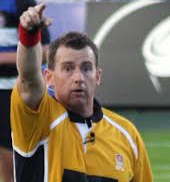
Nigel Owens
Having been involved in the professional game for the best part of 20 years now, I fully appreciate the hard work that goes in on a daily basis for players to perform and the challenges they face mentally and physically throughout the season.
Since becoming a coach, I also know the hours, which all those that support the players put in behind the scenes, whether they are coaches, medics or performance staff. However, I reckon that the toughest job in professional rugby might not be that of the players or management, but that of our referees.
The game’s officials often perform a thankless task and don’t get the chance to share a victory with others like we do. And, in the context of our fast-moving collision-based sport, which has a number of intricate laws, it is very difficult to get everything right.
Coaches and players make many mistakes during 80 minutes of rugby, so it is understandable that referees will also make errors. A lot of these errors are frequently viewed as great decisions by the opposing team, which makes things even more difficult for the man in the middle to get things right.
scotsman
American Football has seven on-field referees, basketball has three and, in Australia, Rugby League now has two. Yet we play a sport which has more players on the field than those sports and has evolved very quickly over the last few years and is scrutinised very closely and the referee is the only person who can blow the whistle during the game. So we should all appreciate those challenging circumstances for referees.
The best referees in the game are those that not only know and apply the laws but also show empathy to the game. What I mean here is that they show an appreciation that it is sometimes very tough to perform your tasks 100 per cent according to the laws and also sometimes allow a game to flow for the benefit of the crowd and the growth of the game.
We have so many laws in rugby union that referees could blow their whistle at every line-out, scrum and ruck, and, if that was the case, we wouldn’t have many spectators left watching the game.
I’ve been following the developments of the National Rugby Championship (NRC) in Australia, which has been running for the last couple of months, and a number of experimental laws have been on trial.
Probably the key change has been raising the value of a conversion from two to three points, while penalties and drop goals have been reduced from three to two points.
This has resulted in an increase in the number of points and tries per game, with five teams currently averaging more than four tries per game.
In contrast to our tournament – the Guinness Pro12, which has already seen some great attacking rugby – only one team has averaged more than four tries per game so far this season.
From what I hear from observers in Australia, a lot rests on the fitness of both the referee and the players to keep up with the pace of this new open rugby in the NRC. The use of the bench has been important, as players have really tired after 60 minutes.
There are a number of other laws they are trying out to speed up the game in the NRC, including a time limit of 30 seconds for setting a scrummage; not straight throws permitted at the line-out if an opposition decides not to contest in the air; and scrum-halves are now able to take a quick tap from a wider area behind the mark and not just on the mark.
It’ll be very interesting to see if the IRB adopt any of these law changes for the global game. Our game is continually evolving and it is important we are looking at ways to keep rugby the best sport on the planet.
I really like some of these ideas, especially the points change which rewards tries while retaining the importance of goal-kicking.
One law I’d like to see re-introduced is being able to call a mark in the 22 directly from re-starts. This used to be the case but was taken out of the game for some reason and now means most teams re-start the game with a long kick rather than looking to win the ball back in the air.
From a Glasgow Warriors perspective, we are delighted to have come away from Italy with a win and bonus point, but we know we’ll have to improve going into our next run of games, starting with Ulster this weekend, who have only lost once in the league at home in the past 12 months.
We’ve played them six times over the past two seasons, and they’ve all been very competitive games with the score standing at 3-3 going into this weekend.
So we expect another very tough game and we’re looking forward to playing in the wonderful atmosphere of the Kingspan Stadium on Saturday.
Let’s hope both teams make life very easy for Nigel Owens, our match referee.